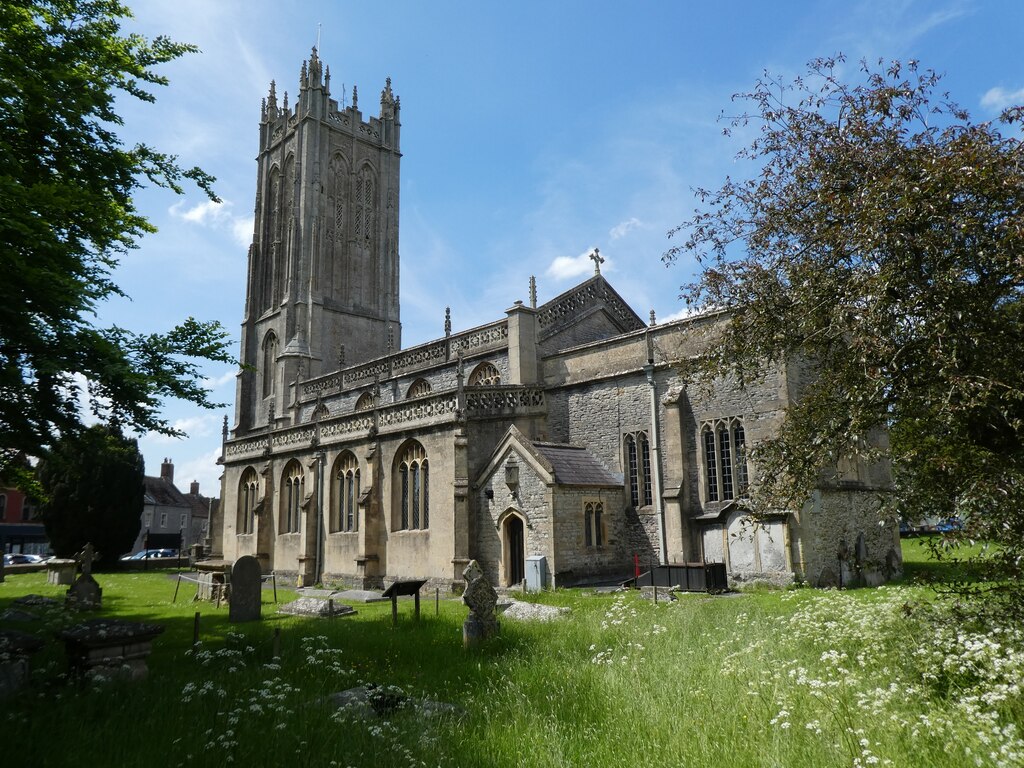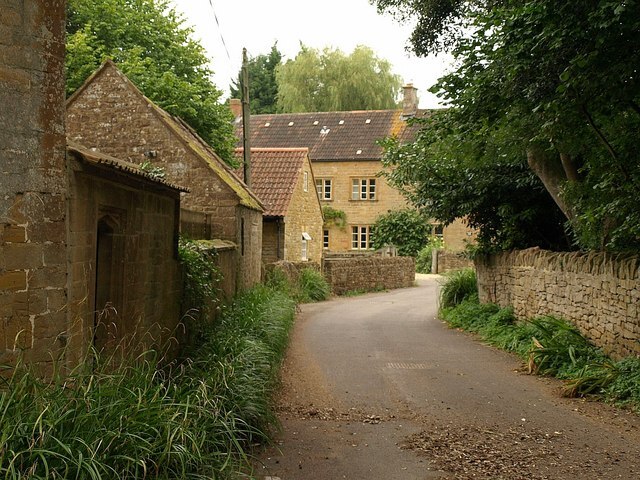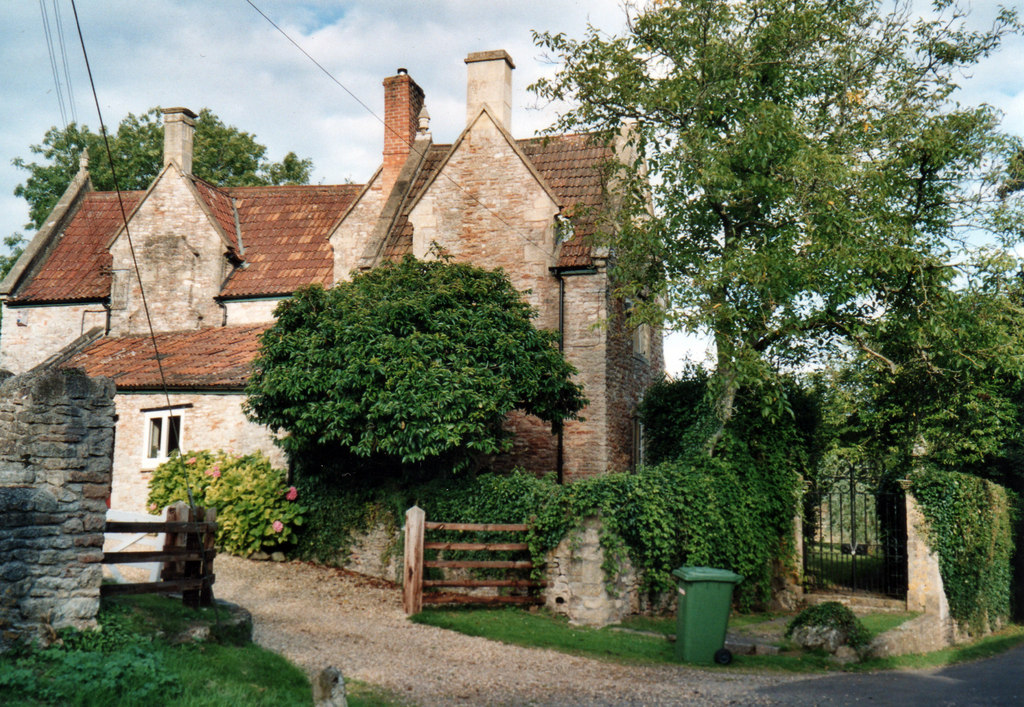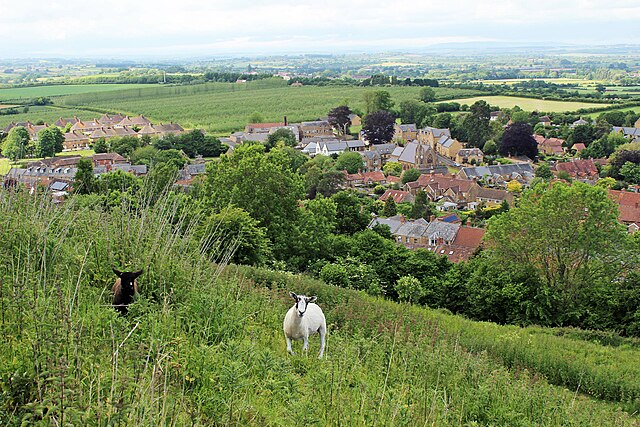Introduction
This is a study of a Somerset farming family over four generations.
1. John Cary
Ancestral home
The Cary family came from Evercreech, a village three miles southeast of Shepton Mallet. The parish registers record Carys in the sixteenth century.
Marriage
George Abraham’s paternal grandfather, John Cary, moved to Norton-sub-Hamdon in the 1840s. Born at Evercreech in about 1785, he married Esther Hiscox by licence at Pilton on 30 March 1808. One of the witnesses was Esther’s brother, Abraham, who occupied Manor Farm, West Compton, Pilton — a farm that played a significant role in the lives of Esther’s descendants.
Occupation
John Cary was ambitious and capable, working his way up from dairyman to farmer. He and Esther lived at Ditcheat, South Petherton and Merriott before settling at Norton-sub-Hamdon, where John farmed 182 acres in March 1851 and 200 acres ten years later. The farm was a significant part of the village, employing eleven men and five boys in April 1861.
Children
John and Esther had two daughters, Jane and Mary, who married local farmers and a son, George.
Death
John Cary died in 1863, leaving an estate valued “under £1,500.” His primary beneficiary was his son, George, who inherited his live and dead farming stock and personal estate, subject to the payment of various legacies. John left his lands in the parish of Hornblotton to his wife for life, then to his son, George, for his life and finally to his grandson, George Abraham Genge, absolutely.[1]

2. George Cary
Birth
John’s only son, George, was born at South Petherton in about 1821.
First marriage
On 8 September 1851, George married Mary Norton at Merriott parish church. She was the daughter of Robert Norton, a butcher of Merriott, who died in 1865, leaving an estate valued at “under £100.”[2]
John and Mary had three children: George Abraham, Joseph Norton and Mary Elizabeth.
Occupation
Initially, George worked on the family farm. After his marriage, George took on the lease of a small farm in the same village.
Following his father’s death in 1863, George took over his father’s farm. The 1871 census recorded him as a farmer of 188 acres, employing ten men, seven boys and three women. Ten years later, he farmed 193 acres and employed ten men and four boys. His son, George Abraham, worked on the family farm until he married in 1876; similarly, his son, Joseph Norton worked on the family farm until his marriage in 1883.
Death of first wife and re-marriage
In 1866, George’s wife, Mary, began to show symptoms of albuminuria, which was due to kidney disease or another underlying condition. She died on 29 September 1868, at the age of 46.[3]
At that time, their sons were 16 and 15, and their daughter was only 9. George may have been partly motivated to remarry to provide a stepmother for his children. On January 6, 1870, he married Martha Moody Hiscox in Shepton Mallet.
Second wife
Martha had had an unsettled childhood. Her father, Thomas, farmed at Pilton until he died in 1828, leaving his widow to raise four young children alone. After her husband’s death, she ran a farm at Huntspill until she was in her fifties, and then moved in with her son, John, a master saddler, at Wells. He was to provide his mother and sister with some security. He never married and died on 28 June 1867 from chronic hepatitis at the age of 43, leaving an estate valued at “under £600.”[4] He left his estate in trust for his mother for life, then his sister Martha for her life, with the capital eventually going to various cousins.[5] This inheritance would have provided Martha and her mother valuable protection from the vicissitudes of life. The 1851 census recorded Martha working as a lady’s maid in the home of a county magistrate. She has not been found on the 1861 census, but was probably still in domestic service. After Martha married George, her mother lived with them until her death in 1879 at the age of 89.
West Compton
In 1887, George and Martha moved to Manor Farm, West Compton, where they remained for ten years. In 1888, George’s daughter, Mary Elizabeth, married Stephen Charles Roger Orledge, a farmer of Pilton.
Retirement and death
In 1897, George retired from farming and lived with his wife in Bread Street, Pilton.[6] He died on 12 March 1902, leaving an estate with a gross value of £3,758-7s-2d. His second wife outlived him by six years.
At the time of his death, George Abraham was his only surviving child. Joseph Norton had died childless in 1895, and Mary Elizabeth passed away in 1899, leaving behind two sons and a daughter.


3. George Abraham Cary
Childhood
In a legal case of 1902, George Abraham Cary testified that he lived at West Compton (a hamlet of Pilton) from the ages of six to twelve, staying with his uncle, who was his father’s tenant. His testimony indicates that he lived at West Compton from about 1858 to 1864. However, the 1861 census shows him living at home with his parents while his brother, Joseph, resided at West Compton. Perhaps he and his brother stayed there intermittently.
The “uncle” that George referred to was actually his great-uncle, Abraham Hiscox, who was the brother of George’s paternal grandmother. Abraham occupied Manor Farm, West Compton, until his death on 1 March 1858. His widow then ran the farm with her married sister, Eliza Norton, until 1882.[7]
First marriage
George married Sarah Genge, the daughter of Abraham and Elizabeth Genge, on 24 February 1876 at Hardington.
White Vine Farm
George was the tenant of White Vine Farm from about 1875 to about 1880.
Thurlbear
From about 1880 to 1890, George was the tenant of Badger Street Farm, Thurlbear.
On 15 June 1882, he attended the bishop’s visitation at Taunton as the churchwarden of Thurlbear.[8]
On 13 August 1889, he reprimanded one of his labourers for poorly tying a sheaf of corn. The labourer reacted by knocking him down and making violent threats. At Taunton police court, the labourer admitted to being “pretty well tight” at the time of the incident but reminded the magistrates that he had “never been up for thievery.” They fined him 5s and added another 5s for costs.[9]
Norton-sub-Hamdon
From 1889 to 1902, George was the tenant of Knapp Farm, Norton-sub-Hamdon. He took over the farm from his brother, Joseph, who moved to Caundle Stourton, a village twenty miles east of Norton-sub-Hamdon.
Three deaths
George’s only brother, Joseph, died at Woodford, Wells, on 30 November 1895, at the age of 42; and his only sister, Mary Elizabeth, died at Home Farm, East Pennard, on 22 November 1899, at the age of 40.[10]
Even more distressing was the loss of his wife, Sarah, who died from pneumonia on 12 May 1898 at the age of 44.[11]
Second marriage
On 14 September 1899, George married Julia Ann Terrell, the daughter of William and Ann Terrell, by licence at Stoke-sub-Hamdon Congregational Chapel.[12]
Julia came from a close-knit farming family. Her father, William, occupied a farm of about sixty acres at Stoke-sub-Hamdon for over thirty years. When Julia was sixteen, her father died in tragic circumstances. After suffering an epileptic fit, he fell and hit his spine on a stone, dying seven days later.[13] Following his death, his widow, Ann, ran the farm with her sons, William and Joseph, and her daughters, Sarah, Julia, and Ellen. Sarah was the only one of her children to marry during her lifetime. After Ann’s death on 2 December 1898, Julia married in 1899 and William in 1900.
Julia’s mother died intestate, leaving an estate valued at £4,278 12s 2d, which was probably divided equally between her five children.[14]
Inheritance
The deaths of George’s brother and sister must have made him acutely aware of the brevity of life. Even more significant was his father’s death on 12 March 1902, which cemented the terms of his father’s will and activated parts of his grandfather’s will.
George’s grandfather, John Cary, had left a life interest in land at Hornblotton to his widow and then to his son, George. On George’s death, the land passed to George’s son, George Abraham.[15]
George Cary left his household effects and any money in his bank accounts to his widow. He left the remainder to his executors on trust to pay the income to his widow for life and, after her death, to pay half the income to his son and his son’s wife, Sarah, for life and the other half to his daughter and her husband for life. Assuming that his furniture had little value and his bank balances were low, the income generated by his estate may have been about £150 per annum, of which George received one-half. This income commenced after the death of George’s mother on 6 February 1908.[16]
Stoke-sub-Hamdon
In 1902, George retired from farming and bought a freehold detached house at Footlands, Stoke-sub-Hamdon.
As it turned out, he enjoyed nearly thirty years of retirement.
Death
Julia died intestate on 20 January 1931, at the age of 74, leaving an estate valued at £506 17s 11d.[17]
George died at Stoke-sub-Hamdon on 14 March 1931, at the age of 79, leaving an estate valued at £4,444 15s 4d.[18]

4. Children
George and Sarah had a daughter, Martha Bessie Genge Cary and a son, Arthur George Abraham Cary.
Martha attended a Ladies’ School in East Street, Taunton. On 2 March 1897, she married Ethelbert Nelson Creed, a farmer of Pilton, at Norton-sub-Hamdon parish church. Martha and Ethelbert lived at Manor Farm, West Compton, until 1903, when they moved to Pennard Hill Farm, East Pennard.[19] Martha died of rheumatism of the heart on 1 April 1915, at the age of 38, leaving behind four sons, all under he age of sixteen.[20]
Arthur emigrated to New Zealand, where he became a farmer. He returned to visit his father in 1921 and returned permanently in the 1930s. He spent his final years at Bournemouth, living at addresses including 3 Landseer Road and 26 Queens Road. He died at the Gables Nursing Home, Bournemouth, on 2 February 1957, at the age of 78.[21]
References
[1] The will of John Cary, dated 11 August 1856, proved at Taunton on 25 January 1865.
[2] Probate Calendars.
[3] Death certificate of Mary Cary; Western Gazette, 9 October 1868, p.8.
[4] Death certificate of John Hiscox.
[5] The will of John Hiscox, dated 25 October 1866, proved at Wells on 18 November 1867.
[6] Western Gazette, 19 February 1897, p.1.
[7] Shepton Mallet Journal, 3 November 1882, p.1.
[8] Taunton Courier and Western Advertiser, 21 June 1882, p.8.
[9] Taunton Courier and Western Advertiser, 21 August 1889, p.8.
[10] Shepton Mallet Journal, 6 December 1895, p.4; Shepton Mallet Journal, 24 November 1899, p.4.
[11] Death certificate of Sarah Cary
[12] Pulman’s Weekly News and Advertiser, 19 September 1899, p.6.
[13] Western Gazette, 7 June 1872, p.8.
[14] Probate Calendars.
[15] The will of John Cary, dated 11 August 1856, proved at Taunton on 25 January 1865.
[16] The will of George Cary, dated 31 May 1897, and codicil, dated 2 January 1898, proved at Wells on 16 August 1902.
[17] Probate Calendars.
[18] The will of George Abraham Cary, dated 15 May 1928, proved in London on 12 May 1931.
[19] Shepton Mallet Journal, 9 April 1915, p.5.
[20] Shepton Mallet Journal, 9 April 1915, p.5.
[21] The Civil Registration Death Index gives his age as 77.
Appendix: the will of George Abraham Cary
Executors and trustees: Gilbert Sandford Poole of South Petherton, solicitor, and William Griffin Terrell of North Street, Stoke-under-Ham.
To my trustees upon trust: all my furniture to allow my wife to enjoy during her lifetime and then to form part of my residuary estate.
To my trustees upon trust: a legacy of £850 to invest, paying the income to my wife for life and then to my grandsons, Nelson Arthur Cary Creed, Percy Douglas Cary Creed and Roger Stanley Cary Creed at 21 in equal shares as tenants in common.
If the £850 now secured on Manor Farm, West Compton, has not been paid off at the date of my death, I authorise my trustees to allocate this security in satisfaction of the said legacy of £850.
To my son, Arthur George Abraham Cary now residing in New Zealand: all my freehold and leasehold land in the parish of Hornblotton, Somerset.
To my trustees: the remainder on trust to convert into money and invest, paying the income to my wife for life and then the capital and income as to one moiety to my son, Arthur George Abraham Cary absolutely and the other moiety to my four grandsons, George Robert Genge Cary, Nelson Arthur Cary Creed, Percy Douglas Cary Creed and Roger Stanley Cary Creed at 21 as tenants in common. The share of George Robert Genge Cary shall not vest absolutely in him but shall be retained and invested by my trustees, paying the income to him for life and then to his son, Garth Cary Lewis Creed absolutely.
If a beneficiary dies leaving children, their children to take in their place, except in the case of George Robert Genge Cary.
Wit: Solicitor and his clerk.



